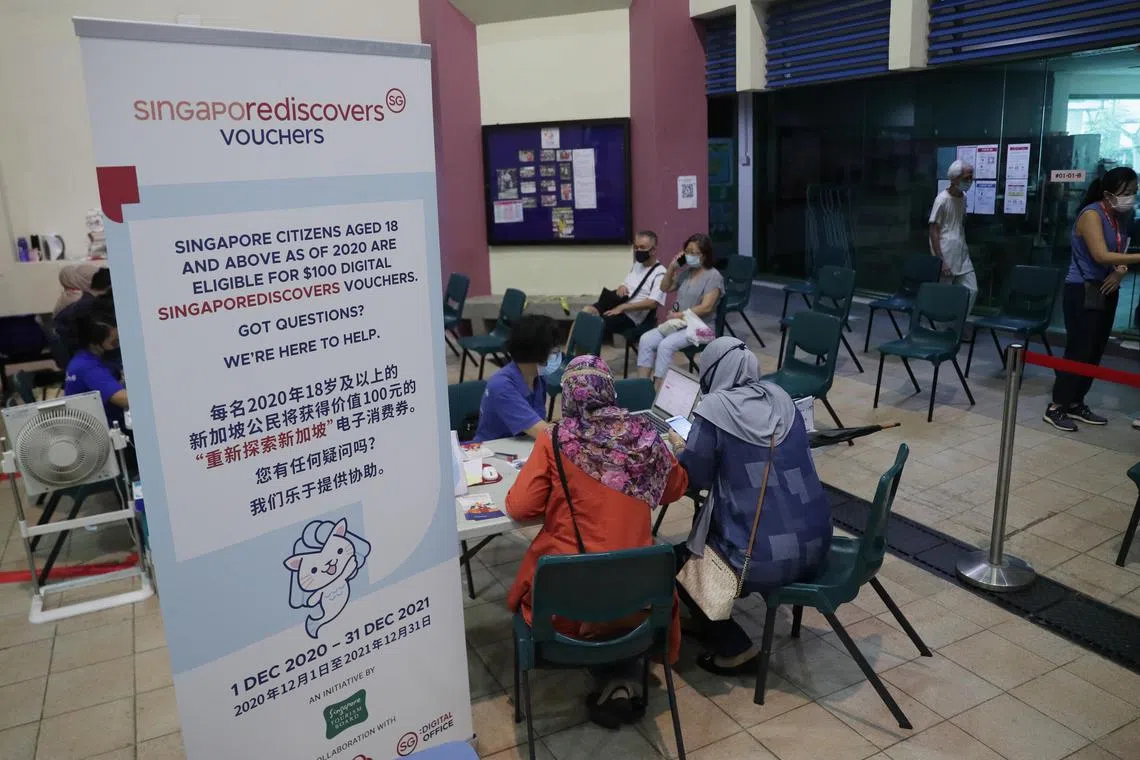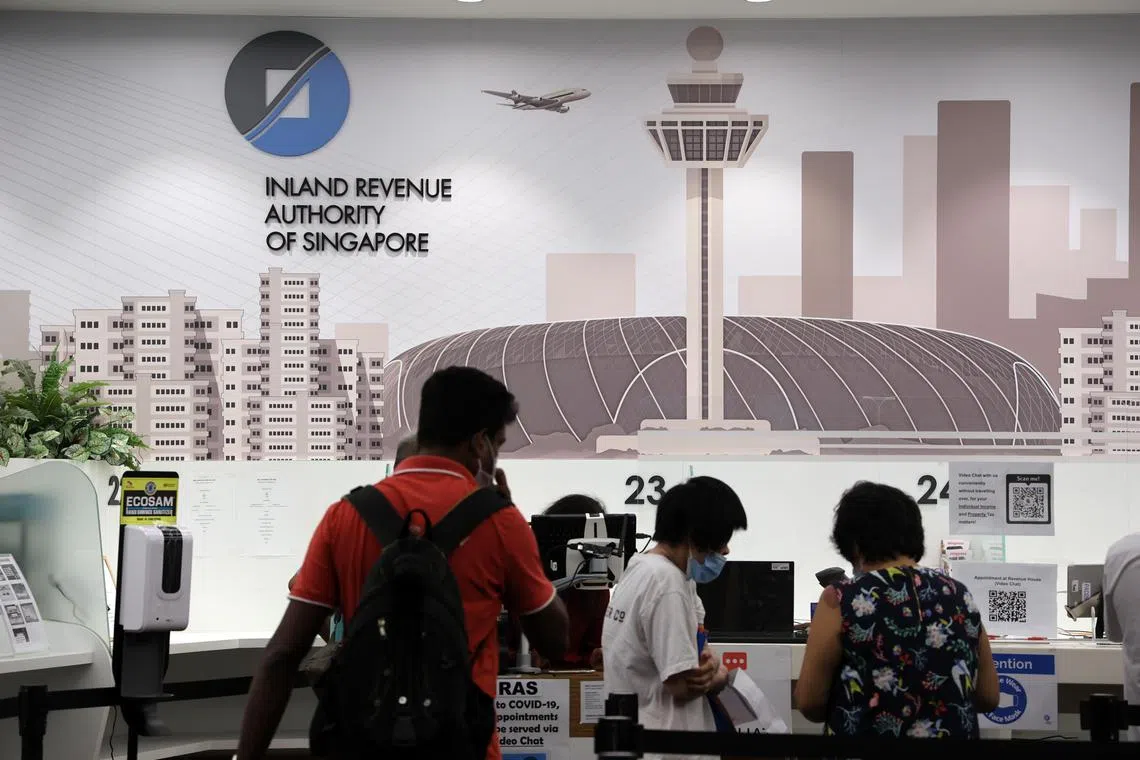Lapses in documentation, controls of Covid-19 schemes: AGO
Sign up now: Get ST's newsletters delivered to your inbox

On the Singapore Rediscovers Vouchers scheme, the AGO found inadequate controls on the inclusion of merchants or products.
ST PHOTO: KELVIN CHNG
SINGAPORE - The Auditor-General’s Office (AGO) has flagged lapses in the documentation and controls of the Jobs Support Scheme (JSS), which it said made it difficult to determine if risks were properly assessed and resulted in grants being wrongly disbursed.
This was one of the findings by the AGO, which conducted a thematic audit on four Covid-19-related grant schemes managed by the Inland Revenue Authority of Singapore (Iras), which comes under the Ministry of Finance (MOF), and the Singapore Tourism Board (STB), which comes under the Ministry of Trade and Industry.
Besides the JSS, the AGO found issues with the Rental Cash Grant (RCG), Rental Support Scheme (RSS) and Singapore Rediscovers Vouchers scheme (SRV).
The audit looked at how the grants were designed and set up, how they were evaluated, approved and disbursed, and subsequently reviewed.
For the JSS, RCG and RSS, the AGO found that MOF did not adequately document key considerations and decisions relating to risks. This meant there was inadequate assurance that a proper risk assessment had been done before the schemes were implemented, it said.
Having sufficient documentation to support key decisions made is critical for effective governance, especially since JSS payouts amounted to $29.38 billion and involved automatic disbursements, added the AGO.
The MOF had also fallen short in documenting evaluations and approvals for JSS appeals. The AGO’s test check of 73 appeal cases revealed a lack of documentation in 48 cases, with disbursements totalling $79.7 million.
In some cases, there were no documents to show how MOF determined if a company was eligible for JSS grants. In other cases, the documents seeking approval for appeals and approvals of appeals were missing.
MOF was also tardy in recovering disbursed grants that needed to be clawed back, the AGO found.
For instance, though the ministry had decided in July 2020 to recover JSS grants from government-funded entities such as hospitals and autonomous universities, there were delays in following up, and inaccurate records to monitor those cases.
In all, 130 entities with existing government funding had received JSS payouts amounting to $1.6 billion. The amount to be recovered depended on the existing funding arrangements of each entity. As at Dec 31, 2022, the MOF had not followed up on a total of $1.07 billion paid to 38 entities.
The AGO also said Iras could have done more to follow up on the return of RCG and RSS grants. There were 7,458 cases of RCG and RSS payouts being returned from Jan 1, 2020, to June 30, 2022, coming up to $88.59 million.
Iras did not have a process to automatically block an ineligible entity from receiving the RSS, even though the entity had been rejected for the RCG for the same reason, AGO noted.
Proper monitoring of grant returns to detect possible systemic issues is important as there is a higher risk of grants that are automatically disbursed being given to unintended recipients, it added.

Inland Revenue Authority of Singapore could have done more to follow up on the return of RCG and RSS grants, the AGO said.
PHOTO: LIANHE ZAOBAO
On the SRV scheme, the AGO found inadequate controls on the inclusion of merchants or products.
STB had disbursed $178.27 million under the scheme,
In its checks of 80 merchants, AGO found that 12 were included despite there being inadequate documents to show that they had met one of several eligibility criterion. The 12 received a total $17.84 million from the scheme.
AGO’s checks also found that 950 products sold by 37 merchants were included in the scheme, even though these were not submitted for eligibility checks. These accounted for $4.81 million of disbursements under the scheme.
Taken together, there was inadequate assurance that STB had a robust process to ensure only eligible merchants and products were included, said AGO.
The AGO also found some people had made false declarations to get subsidies for children and youth, totalling $119,800, when the tickets were not used by people under 18.
In response to the AGO report, MOF said in a statement that Singapore was dealing with a major disruption during the Covid-19 pandemic, and the Government had to mount an unprecedented response in terms of size, scope and speed to support businesses and workers.
“Public agencies operated under tight timelines and had to manage overlapping waves of policy planning, implementation and review. They also had to take on new roles and functions in addition to their usual operations, redeploy and stretch manpower, repurpose IT systems and available data to respond effectively to the crisis,” added MOF.
“Despite these challenges, the public service officers rallied and implemented the Covid-19 grant schemes in a timely manner.”
MOF also said that though the documentation of processes and risk assessments may not have been complete due to fast-moving developments and time constraints during the pandemic, “each decision was duly deliberated”.
The ministry added that the $86.2 million in total that it had to claw back – after it reassessed the schemes following the audit – make up less than 0.5 per cent of total payouts across the JSS, RCG and RSS.
“We have recovered about 99.7 per cent of overpayments, and will continue to work with the entities to recover the rest,” added MOF.
In a separate statement, the STB said it was “firmly committed to good corporate governance and the responsible use of public funds”.
It noted that the SRV scheme was launched within four months amid the pandemic.
“Given the urgency of supporting local tourism businesses and jobs, and the complexity of designing the Government’s nationwide digital-only voucher scheme for the first time, we are heartened by AGO’s findings that STB had thought through the scheme design and put in place the necessary controls to ensure proper management,” it said.
STB also said that it had taken steps to review and tighten its processes based on the audit observations.
The AGO noted in its report that the Government had to develop and implement new grant schemes rapidly during the pandemic, and public sector agencies had to work within tight timelines and highly fluid conditions.
But it is important to identify and document key risks involved in rapid implementation of grant schemes to help agencies make informed decisions, the AGO added.
The AGO also stressed the importance of proper governance of scripts and datasets, which are used in data analytics.
Both IRAS and STB had harnessed data analytics to sieve out those who might try to game the system and check on disbursements respectively. The AGO said the scripts and datasets used in such checks were updated, but there was a need to ensure proper authorisation for the changes.
It added that there is room for improvement in the level of documentation and communication of key matters during crises.
As multiple agencies are involved in designing and implementing various Covid-19 grant schemes, better documentation would ensure all agencies are on the same page, as well as greater accountability and transparency, the AGO said.
Editor’s note: This article has been edited for clarity.



